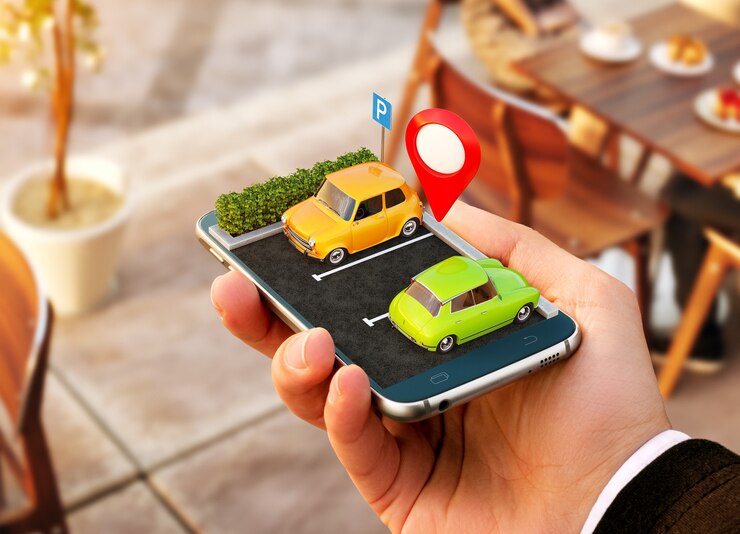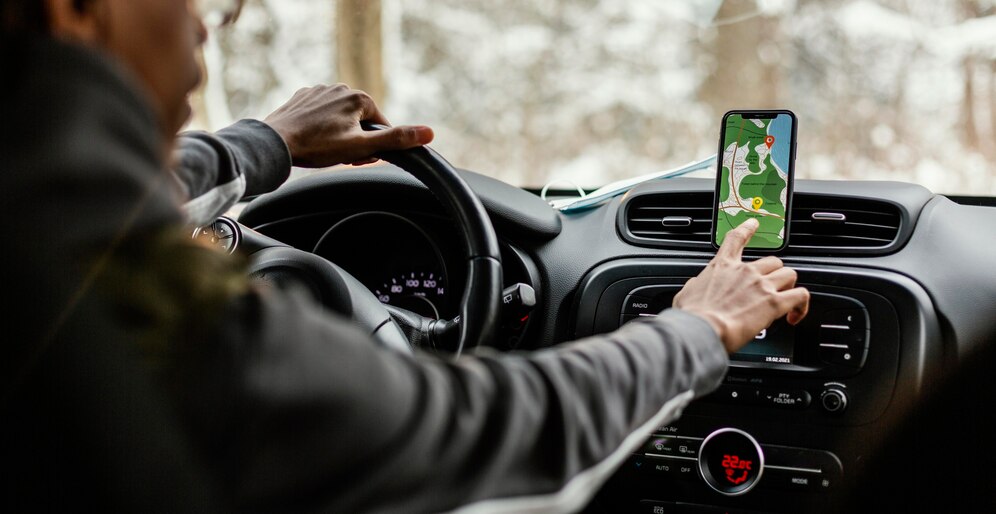Author: Ankit
Date: 14-11-2024
The taxi booking industry has been transformed by the advent of mobile apps, bringing convenience to users and efficiency to drivers. GPS technology has been central to this transformation, enabling location-based services, real-time tracking, and seamless communication. For businesses looking to develop a robust taxi booking app, partnering with a Taxi Booking app development company in India can provide the technical expertise needed to fully leverage GPS technology.
In this guide, we will discuss how GPS enhances taxi booking apps, essential GPS-based features, and the role of an app development company in India in building these features.
Benefits of GPS Technology in Taxi Booking Apps
GPS (Global Positioning System) is crucial to the functionality and reliability of taxi booking apps, offering various advantages to both users and service providers. Here’s how GPS enhances the taxi booking experience:
- Accurate Location Tracking: GPS allows users and drivers to identify their locations in real-time, ensuring precise pickup and drop-off points.
- Efficient Route Optimization: GPS enables dynamic route calculation, helping drivers take the shortest and most time-efficient routes.
- Enhanced Safety: Real-time location sharing improves passenger safety by allowing friends or family to track the journey.
- Cost Transparency: Distance-based fare calculation provides transparency and avoids disputes over trip charges.
- Increased Reliability: GPS minimizes waiting times and ensures that drivers reach passengers quickly and efficiently.
Key GPS-Driven Features in Taxi Booking Apps
GPS technology forms the backbone of many features in a taxi booking app. An app development company in India can help integrate these GPS-based features to make the app user-friendly and efficient. Here are the most important GPS-driven features:
- Real-Time Tracking: Allows users to track the driver’s arrival and estimated time to the destination.
- Location-Based Booking: Identifies the user’s current location to offer accurate pickup options and nearby drivers.
- Route Optimization: Calculates the most efficient route in real-time, minimizing travel time and fuel costs.
- Geofencing: Sets up virtual boundaries, enabling location-based alerts and enhancing safety measures.
- Fare Calculation: Uses distance and time metrics to calculate accurate fares, providing cost transparency to users.
- Emergency Assistance: Enables users to share their location with emergency contacts in case of distress.
- Driver Allocation: Automatically assigns drivers closest to the pickup location, reducing wait time.
How GPS Works in Taxi Booking Apps
Understanding the role of GPS in taxi booking apps requires a look at the fundamental GPS functions. Here’s a breakdown of how GPS technology works in taxi apps:
- Location Detection: GPS satellites connect to mobile devices to determine a user’s or driver’s location in real-time. This information is then used for pickup and drop-off locations.
- Mapping and Navigation: Maps are integrated with GPS to help drivers follow the best route. They also update in real-time based on traffic conditions.
- Real-Time Tracking: The app continuously updates the driver and passenger’s position, allowing both parties to track the journey from start to finish.
- Route Calculation: The app calculates routes based on distance, estimated time, and live traffic data, making route optimization possible.
- Distance-Based Fare Calculation: GPS data helps in calculating fares based on distance traveled, ensuring accurate pricing for each trip.
GPS Features and Their Functions
| Feature | Description | Benefits |
|---|---|---|
| Location Detection | Identifies user and driver location in real-time | Accurate pickup and drop-off points |
| Mapping and Navigation | Provides real-time navigation and route updates | Optimized routes, reduced travel time |
| Real-Time Tracking | Tracks driver and passenger location throughout the journey | Enhanced safety, reduced waiting time |
| Route Calculation | Calculates efficient routes based on distance and traffic | Reduced fuel costs, optimized travel |
| Fare Calculation | Calculates fare based on distance traveled and time | Transparent pricing, minimal disputes |
Types of Taxi Booking Apps and GPS Requirements
| Type of Taxi App | GPS Requirements | Estimated Development Cost (USD) |
|---|---|---|
| Single Vendor Taxi App | Basic GPS tracking, location-based booking, fare calculation | $15,000 - $25,000 |
| Multi-Vendor Taxi App | Real-time tracking, driver allocation, route optimization | $25,000 - $50,000 |
| Ride-Sharing App | Advanced GPS tracking, geofencing, shared route updates | $30,000 - $60,000 |
| Corporate Taxi App | GPS tracking, route scheduling, real-time tracking for safety | $40,000 - $70,000 |
Challenges in Implementing GPS in Taxi Booking Apps
While GPS technology greatly enhances the functionality of taxi booking apps, it also presents certain challenges. Here are some of the common issues and potential solutions:
- Battery Drain: Continuous GPS tracking consumes battery quickly. Developers can use energy-efficient methods like interval tracking instead of constant tracking.
- Accuracy in Urban Areas: GPS accuracy can decrease in densely populated areas. Supplementing GPS with Wi-Fi and cell tower data can improve accuracy.
- Privacy Concerns: Continuous location tracking raises privacy issues. Clear data policies and the option for users to control location sharing are essential.
- Connectivity Issues: Rural areas or regions with poor connectivity can affect GPS performance. Caching location data and using offline mapping options can help.
Role of a Mobile App Development Company in India in GPS Integration
Integrating GPS technology effectively requires advanced technical expertise and an understanding of user needs. Here’s how an experienced mobile app development company in India can help enhance GPS functionality in taxi booking apps:
- Optimized GPS Usage: By balancing real-time tracking with energy-efficient methods, developers can ensure that the app’s GPS functionality is effective without excessively draining the battery.
- Advanced Mapping Features: Integration of Google Maps, Apple Maps, or other mapping APIs to provide accurate navigation and location tracking.
- Enhanced Security: Implementing geofencing, real-time tracking, and sharing options to enhance passenger safety and confidence.
- Custom GPS Solutions: Creating custom solutions for fare calculation, route optimization, and driver allocation to suit specific business needs.
- Location-Based Notifications: Incorporating push notifications based on location, such as arrival alerts and estimated time of arrival updates.
Future of GPS in Taxi Booking Apps
The future of GPS technology in taxi booking apps is promising, with several emerging trends that will improve functionality further. Here are some upcoming trends:
- Augmented Reality (AR) Navigation: Future taxi apps may integrate AR for a more immersive navigation experience, helping drivers identify landmarks and routes more easily.
- AI-Powered Route Optimization: Combining AI with GPS will enable dynamic route recalculation based on changing traffic patterns, weather, and other factors.
- 5G Integration: Faster and more reliable connections with 5G will improve real-time tracking and routing accuracy, especially in high-density areas.
- Autonomous Vehicles: GPS will play a crucial role in the development of self-driving taxis, helping vehicles navigate and interact with their environment.
Conclusion
GPS technology is a game-changer for taxi booking apps, offering benefits ranging from accurate location tracking to optimized routes and enhanced safety features. To build a successful taxi app, collaborating with a mobile app development company in India ensures the integration of advanced GPS features that enhance the overall user experience. As GPS continues to evolve, taxi booking apps will become even more efficient, reliable, and user-friendly.
1Your choice of weapon
Build your Apps for any Platform
Latest Blogs

Custom Bike Rental Solutions by India's Best Mobile App Development Company
Posted On: 13-Aug-2024
Category: taxi booking




India's Best Mobile App Development Company | Taxi Booking App Services
Posted On: 13-Aug-2024
Category: taxi booking
Related Services






We to code. It's our passion










you can also reach us at our given
email address or phone number.





